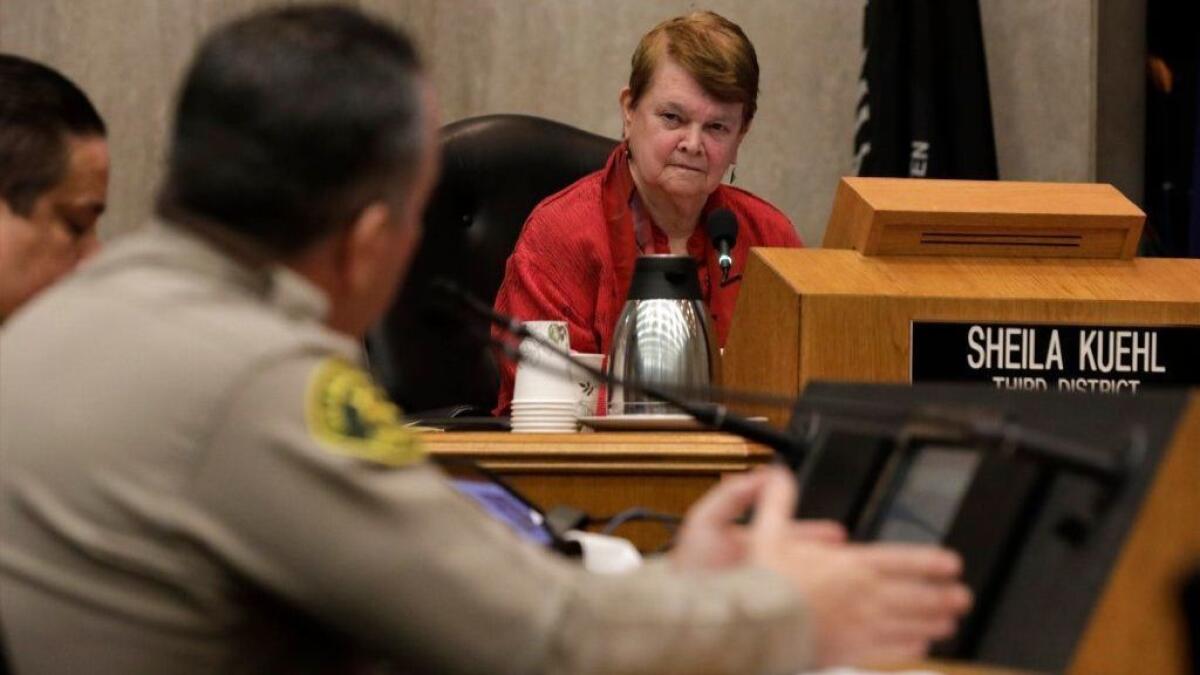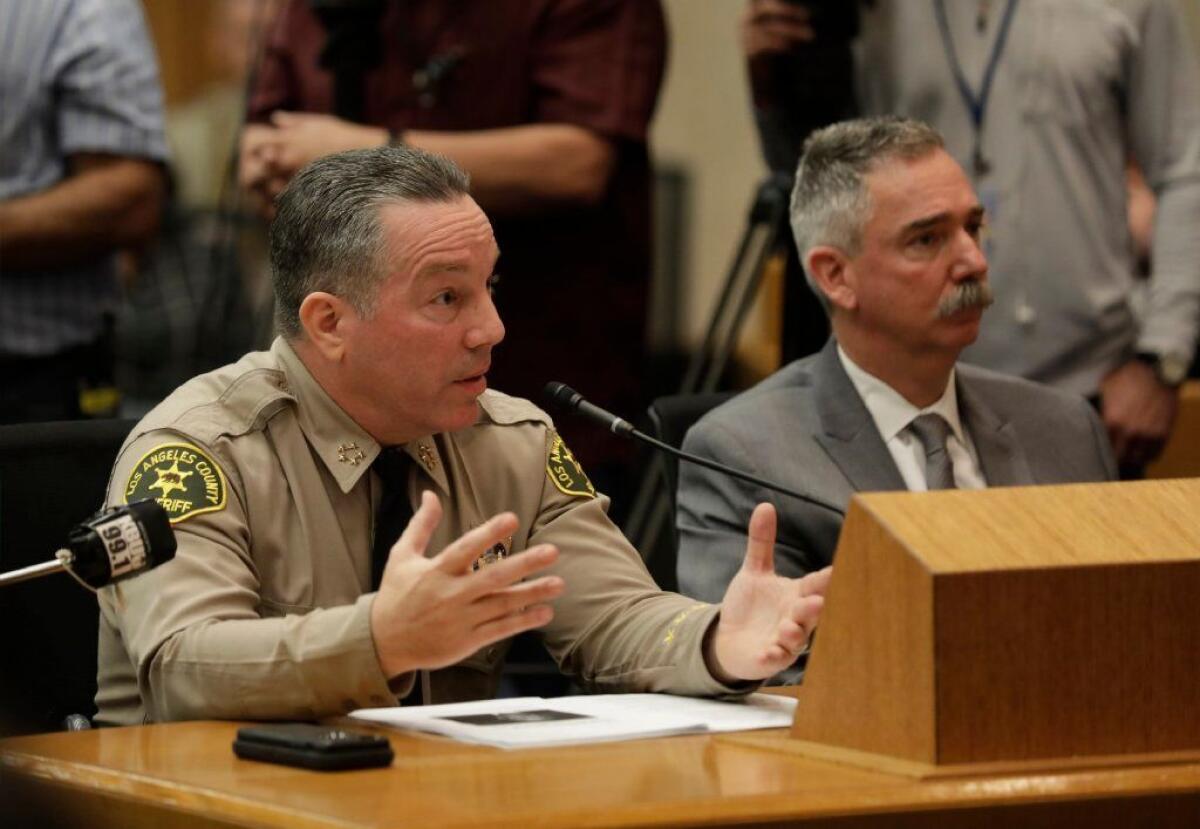L.A. County sheriff and supervisors are at odds. This could cost Villanueva

In June 2017, former Los Angeles County Sheriff Jim McDonnell went before the Board of Supervisors to ask for help. Short on time, he leapfrogged other county agencies to make a case for his proposed $3-billion budget, noting the ballooning costs of paying deputies overtime and of managing mental health services inside the department’s jails.
“I ask you to join me in moving forward, collaboratively, to address the challenges that we face,” McDonnell said.
And, for the most part, the supervisors agreed.
It’s tough to imagine such a scene today.
In the months since voters elected Alex Villanueva to replace McDonnell, the relationship between the supervisors and the sheriff has turned antagonistic.
The catalyst was Villanueva’s decision during his first weeks on the job to reinstate Caren Carl Mandoyan, a deputy who was fired after being accused of domestic violence and lying to internal investigators.
And Villanueva may have put still more strain on the political relationship. He confirmed Wednesday that in his first few months in office, he reinstated yet another deputy, Michael Courtial, who was fired for using unreasonable force against a suspect.
Even as a court fight has ensued over Mandoyan, Villanueva has remained defiant in the face of criticism.
“I am actually assuming the proper role of the sheriff, which is to run the Sheriff’s Department,” Villanueva said in an interview Thursday. “I don’t tell the board how to do their jobs, and I don’t think they have either the legal authority or right to dictate how I, as an elected official and the sheriff, run the Sheriff’s Department. That’s why the voters elected me.”
Villanueva’s position on reinstating fired deputies has perplexed the Board of Supervisors, a low-profile but powerful governing body that controls a $30-billion budget to operate courts and public services, and maintain infrastructure in Los Angeles County.
The dispute could complicate the willingness of the board and the sheriff to work together on pressing issues involving the department, including the future of the county’s sprawling jail system and the powers granted to its civilian monitors.
And with the next budget cycle rapidly approaching — the first for Villanueva — the sheriff’s ability to command respect from the elected officials and county staffers who control his funding is on increasingly shaky ground, according to interviews with county officials.
“It really does sadden me that the relationship that the Board of Supervisors has with the sheriff is such that there is no trust,” said Supervisor Kathryn Barger, typically a law enforcement ally whose husband is a retired deputy sheriff. “I don’t know what it’s going to take to break that barrier with him. On this issue, I just don’t know what his thinking is.”
Because sheriffs in California are elected, not appointed, the annual budgeting process is when county supervisors can exert the most leverage and authority over sheriffs and their departments. Villanueva, like other top county law enforcement officials, has an autonomy over spending, management and policy, none of which is typically afforded by law to the heads of most other county agencies.
Barger, who worked as a county staffer for decades before running for elected office, has seen the board interact with many sheriffs over the years, many of them controversial. She said she’s “perplexed” by how relations soured so quickly — a common sentiment among the members of the board and their staffs.
First and foremost at issue is Villanueva’s insistence on reinstating Mandoyan, who was fired under McDonnell in 2016 over allegations that he assaulted and tried to break into the house of a fellow deputy — then his girlfriend — and lied about it.
Villanueva maintains that Mandoyan, who was a volunteer on the sheriff’s campaign last year, was unfairly terminated, in an example of a disciplinary system that both men perceive as having turned against rank-and-file deputies.
The decision to reinstate Mandoyan led the majority-female Board of Supervisors to authorize the county’s controller to stop paying Mandoyan in March and order him to return his badge. The supervisors also authorized county lawyers to seek an emergency injunction.
A judge ruled March 6 that the case didn’t warrant such an intervention and instead scheduled a hearing for late June — about the same time the supervisors will be finishing their deliberations on the county’s multibillion-dollar budget.
There is still deep political support on the board to maintain spending levels on law enforcement, but the tense situation with the sheriff could make discussions about specific funding priorities more complicated — and any differences more evident.

The relationship has never been easy.
Four of the five supervisors endorsed McDonnell’s reelection bid last year — a fact that perhaps affected Villanueva’s posture with the board from the start.
Supervisor Sheila Kuehl, a strong voice for criminal justice reform and women’s rights, asked to meet with the sheriff soon after his upset victory, even though she had backed his opponent.
“He was guarded,” she recalled. “He assumed we would have some hostility. I didn’t. He won fair and square, and I said, ‘Let’s roll up our sleeves and work together.’”
Then came the sheriff’s decision to create a “truth and reconciliation” panel to examine disciplinary cases settled against deputies under McDonnell, who had a by-the-book reputation.
Before Villanueva even took office, he sought to return Mandoyan to service, despite a county Civil Service Commission decision to uphold his termination. In a report, commission hearing officer Joseph Scully said that video evidence showed Mandoyan stalked his former girlfriend and tried to break into her home multiple times.
Mandoyan’s reinstatement sparked criticism and consternation from the board. Supervisors also have questioned the legality of the sheriff’s “truth and reconciliation” panel, which the Sheriff’s Department says was not involved in the reinstatement of Courtial, who was fired last June after he threatened to shoot a man before yanking him from his truck and punching him several times. Investigators concluded Courtial used unreasonable force and failed to properly use de-escalation the 2016 encounter in Lancaster.
On Thursday, Villanueva remained confident and defiant, casting the supervisors’ criticism as political because they didn’t support his campaign. He said he’s only fulfilling a promise to restore deputies’ confidence that they will receive due process in disciplinary cases.
“They’ve made it pretty antagonistic,” the sheriff said of the supervisors, “and I’m going to be the better man and hold my head high and keep doing my job, working with the community. Our support within the community is very, very strong, and this misguided effort from the board to play politics is counterproductive. It doesn’t improve the public safety, and it doesn’t further the public interest. It only serves a very narrow political interest — of payback.”
Zev Yaroslavsky, who spent years as both a county supervisor and a L.A. City Council member, said he has never seen anything like what Villanueva is doing.
“He is thumbing his nose at the board,” said Yaroslavsky, whose four-decade career included run-ins with controversial leaders in law enforcement, including former Los Angeles Police Chief Daryl Gates and the late Sheriff Sherman Block. But Villanueva’s maverick approach to leadership is new and has sparked concern.
Although Villanueva had no prior experience leading an agency the size of the L.A. County Sheriff’s Department, he has embarked on destabilizing personnel moves, such as replacing the entire executive team after taking office in December and announcing that he would reassess the qualifications of hundreds of senior managers.
At the same time, the sheriff’s passion for protecting rank-and-file deputies has inspired many of them to continue their support, despite early signs of a troubled relationship with county leadership.
“I’ve talked to numerous deputies, and what they’ve said they feel is that they can go to work again feeling like, at the end of the day, this sheriff is going to give them due process,” said Det. Ron Hernandez, president of the Assn. for Los Angeles Deputy Sheriffs, a union of rank-and-file peace officers.
Villanueva earned the group’s endorsement during the campaign and it spent more than $1 million on his behalf, with its leaders believing Villanueva could connect with fellow deputies in a way that McDonnell, a onetime Long Beach police chief, could not.
Hernandez acknowledged that the “optics” of the Mandoyan case and Villanueva’s early interactions with the Board of Supervisors haven’t been ideal.
“There’s always room for improvement,” he said. “Give the guy a chance. I think his heart is in the right place, both for the department and the community.”
The supervisors haven’t bought into that message yet.
“You’re a duly elected official in the county of Los Angeles, as we are,” Supervisor Janice Hahn said to the sheriff during a contentious public meeting last month. “You know, you have no other source of revenue independent from the county of Los Angeles. We’re tied together. And we believe we have a right to weigh in on decisions that you make.”
That policing power entrusted to the sheriff, whose department provides patrol services in numerous municipalities under county contracts, still binds the supervisors to his office, and could one day align the supervisors and Villanueva, as Hahn noted.
For now, though, it could be difficult for Villanueva to navigate the politics at the Hall of Administration, where past sheriffs have met privately with supervisors and their top deputies to smooth the way for their policies.
But hope remains that the board and sheriff can ultimately work together.
“I’m hoping that he’s still getting acclimated to the position, and as time rolls on he will recognize the need to work together,” Barger said. “Don’t mistake my kindness for weakness. I’m not going to let him roll over me. But, at the same time, I’m not going to condemn him based on his first three months in office. It’s important that we work together.”
Times staff writer Maya Lau contributed to this story.
More to Read
Sign up for Essential California
The most important California stories and recommendations in your inbox every morning.
You may occasionally receive promotional content from the Los Angeles Times.











